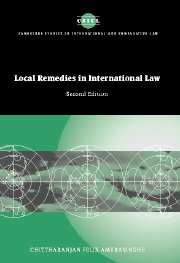Book contents
- Frontmatter
- Contents
- Preface
- Table of cases
- List of abbreviations
- Part I Prolegomena
- 1 Introduction
- 2 The evolution of the law relating to local remedies
- 3 Basis of the rule
- 4 The rule, denial of justice and violation of international law
- 5 Contracts, violation of international law, denial of justice and the rule
- Part II Application of the rule
- Part III Peripheral and analogous applications of the rule
- Part IV Nature of the rule
- Part V Epilogue
- Index
- CAMBRIDGE STUDIES IN INTERNATIONAL AND COMPARATIVE LAW
1 - Introduction
from Part I - Prolegomena
Published online by Cambridge University Press: 03 May 2010
- Frontmatter
- Contents
- Preface
- Table of cases
- List of abbreviations
- Part I Prolegomena
- 1 Introduction
- 2 The evolution of the law relating to local remedies
- 3 Basis of the rule
- 4 The rule, denial of justice and violation of international law
- 5 Contracts, violation of international law, denial of justice and the rule
- Part II Application of the rule
- Part III Peripheral and analogous applications of the rule
- Part IV Nature of the rule
- Part V Epilogue
- Index
- CAMBRIDGE STUDIES IN INTERNATIONAL AND COMPARATIVE LAW
Summary
The subject
It is acknowledged generally that local remedies are relevant to the settlement of certain international disputes involving states. The rule that such remedies must be exhausted owes its origin to the diplomatic protection of aliens in which area it was first applied. That the celebrated ‘rule of local remedies’ is accepted as a customary rule of international law needs no proof today, as its basic existence and validity has not been questioned. The rule has been affirmed in recent diplomatic practice, particularly by developed countries against whom or in regard to whose nationals the rule is most likely to be invoked in regard to the protection of aliens. It has been assumed to exist as a principle of customary or general international law in such conventions as the International Covenant on Civil and Political Rights, the European Convention on Human Rights and the American Convention on Human Rights. Moreover, in recent history it has been invoked in international litigation before both the International Court of Justice (ICJ) and other arbitral tribunals in circumstances in which such international courts have conceded either expressly or implicitly that the rule exists. For example, the rule was invoked by the respondent state before the ICJ in the Interhandel Case, where the Court stated categorically that ‘The rule that local remedies must be exhausted before international proceedings may be instituted is a well-established rule of customary international law’.
- Type
- Chapter
- Information
- Local Remedies in International Law , pp. 3 - 21Publisher: Cambridge University PressPrint publication year: 2004



